Related Research Articles

Mehmet Ziya Gökalp was a Turkish sociologist, writer, poet, and politician. After the 1908 Young Turk Revolution that reinstated constitutionalism in the Ottoman Empire, he adopted the pen name Gökalp, which he retained for the rest of his life. As a sociologist, Ziya Gökalp was influential in the negation of Islamism, pan-Islamism, and Ottomanism as ideological, cultural, and sociological identifiers. In a 1936 publication, sociologist Niyazi Berkes described Gökalp as "the real founder of Turkish sociology, since he was not a mere translator or interpreter of foreign sociology".

The Young Turks was a constitutionalist broad opposition movement in the late Ottoman Empire against Sultan Abdul Hamid II's absolutist regime. The most powerful organization of the movement, and the most conflated, was the Committee of Union and Progress (CUP), though its goals, strategies, and membership continuously morphed throughout Abdul Hamid's reign. By the 1890s, the Young Turks were mainly a loose and contentious network of intelligentsia exiled in Western Europe and Egypt that made a living by selling their newspapers to secret subscribers.
Liberalism was introduced in the Ottoman Empire during the Tanzimat period of reformation.

The Young Turk Revolution was a constitutionalist revolution in the Ottoman Empire. Revolutionaries belonging to the internal Committee of Union and Progress, an organization of the Young Turks movement, forced Sultan Abdul Hamid II to restore the Constitution, recall the parliament, and schedule an election. Thus began the Second Constitutional Era.
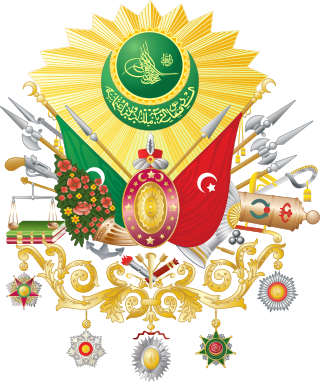
The Second Constitutional Era was the period of restored parliamentary rule in the Ottoman Empire between the 1908 Young Turk Revolution and the 1920 dissolution of the General Assembly, during the empire's twilight years.

Ahmet Ağaoğlu, also known as Ahmet Bey Ağaoğlu, was a prominent Azerbaijani and naturalized Turkish politician, publicist and journalist. He was one of the founders of Pan-Turkism and liberal Kemalism.
The Three Pashas, also known as the Young Turk triumvirate or CUP triumvirate, consisted of Mehmed Talaat Pasha, the Grand Vizier and Minister of the Interior; Ismail Enver Pasha, the Minister of War and Commander-in-Chief to the Sultan; and Ahmed Djemal Pasha, the Minister of the Navy and governor-general of Syria, who effectively ruled the Ottoman Empire after the 1913 Ottoman coup d'état and the subsequent assassination of Mahmud Shevket Pasha.

The 31 March incident was a political crisis within the Ottoman Empire in April 1909, during the Second Constitutional Era. The incident broke out during the night of 30–31 Mart 1325 in Rumi calendar, thus named after 31 March where March is the equivalent to Rumi month Mart. Occurring soon after the 1908 Young Turk Revolution, in which the Committee of Union and Progress (CUP) had successfully restored the Constitution and ended the absolute rule of Sultan Abdul Hamid II, it is sometimes referred to as an attempted countercoup or counterrevolution. It consisted of a general uprising against the CUP within Istanbul, largely led by reactionary groups, particularly Islamists opposed to the secularising influence of the CUP and supporters of absolutism, although liberal opponents of the CUP within the Liberty Party also played a lesser role. The crisis ended after eleven days, when troops loyal to the CUP restored order in Istanbul and deposed Abdul Hamid.

Ahmed Rıza was an Ottoman educator, activist, revolutionary, intellectual, politician, polymath, and a prominent member of the Young Turks. He was also a key early leader of the Committee of Union and Progress.

Mahmud Shevket Pasha was an Ottoman generalissimo and statesman, who was an important political figure during the Second Constitutional Era. During the 31 March Incident, Shevket Pasha and the Committee of Union and Progress overthrew Abdul Hamid II after an anti-Constitutionalist uprising in Constantinople. He played the role of a power broker after the crisis, balancing the various factions of the Young Turks and the army. As War Minister he played a leading role in military reform and the establishment of Air Divisions. Shevket Pasha became Grand Vizier during the First Balkan War in the aftermath of the 1913 coup d'état, from 23 January 1913 until his death by assassination.
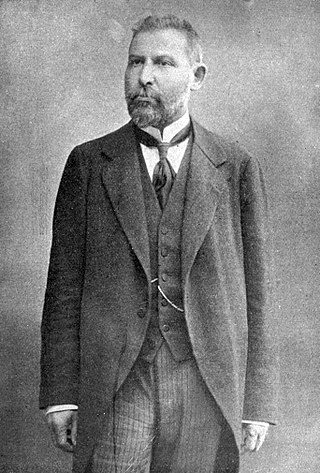
Abdullah Cevdet was a Ottoman Kurdish intellectual and physician. He was one of the founders of the Committee of Union and Progress (CUP) and wrote articles with pen name of "Bir Kürd" for the publications such as Meşveret, Kurdistan and Roji Kurd about Kurdish awakening and nationalism. In 1908, he joined the Democratic Party which merged with the Freedom and Accord Party in 1911. He was also a translator, radical free-thinker, and an ideologist of the CUP until 1908.
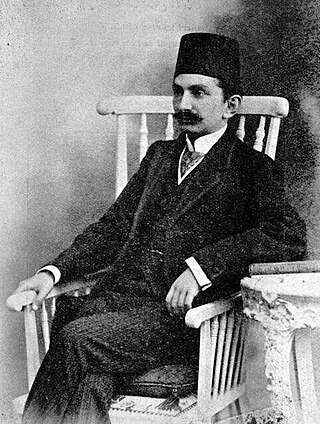
Sultanzade Mehmed Sabahaddin was an Ottoman prince, sociologist and intellectual. Because of his threat to the ruling House of Osman, of which he was a member, and his political activity and push for democracy in the late 19th and early 20th centuries, he was exiled. He was one of the founders of the short-lived Liberty Party.

Mehmet Nexhip bej Draga was an Albanian politician who was an important figure of the Albanian National Awakening.
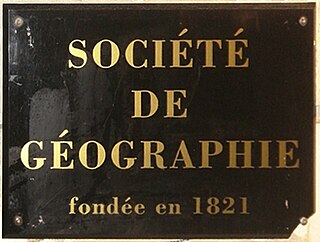
The Arab Congress of 1913 met in a hall of the French Geographical Society at 184 Boulevard Saint-Germain, Paris from June 18–23 in Paris to discuss more autonomy for the Arab people living under the Ottoman Empire. Furthermore The Arab National Congress, which was established by 25 official Arab Nationalists delegates, was convened to discuss desired reforms and to express their discontent with some Ottoman policies. It took place at a time of uncertainty and change in the Ottoman Empire: in the years leading up to World War I, the Empire had undergone a revolution (1908) and a coup (1913) by the Young Turks, and had been defeated in two wars against Italy and the Balkan states. The Arabs were agitating for more rights under the fading empire and early glimmers of Arab nationalism were emerging. A number of dissenting and reform-oriented groups formed in Greater Syria, Palestine, Constantinople, and Egypt. Under Zionist influence, Jewish immigration to Palestine was increasing, and England and France were expressing interest in the region, competing for spheres of influence.
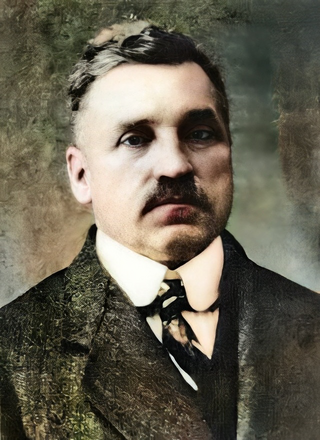
Selanikli Mehmed Nâzım Bey also known as Doktor Nazım was a Turkish physician, politician, and revolutionary. Nazım Bey was a founding member of the Committee of Union and Progress, and served on its central committee for over ten years. He played a significant role in the Armenian genocide and the expulsion of Greeks in Western Anatolia. He was convicted for allegedly conspiring to assassinate Mustafa Kemal Atatürk in İzmir and was hanged in Ankara on 26 August 1926. He also served as the chairman of the Turkish sports club Fenerbahçe S.K. between 1916 and 1918.
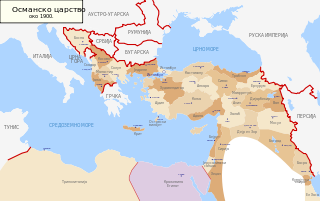
This is a bibliography of notable works about the Ottoman Empire.

The Committee of Union and Progress, refers to several revolutionary groups and a political party active between 1889 and 1926 in the Ottoman Empire and the Republic of Turkey. The foremost faction of the Young Turks, the CUP instigated the 1908 Young Turk Revolution, which ended absolute monarchy and began the Second Constitutional Era. After an ideological transformation, from 1913 to 1918, the CUP ruled the empire as a dictatorship and committed genocides against the Armenian, Greek, and Assyrian peoples as part of a broader policy of ethnic erasure during the late Ottoman period. The CUP and its members have often been referred to as Young Turks, although the movement produced other political parties as well. Within the Ottoman Empire its members were known as İttihadcılar ('Unionists') or Komiteciler ('Committeemen').
The Action Army, also translated as the Army of Action, was a rebellion force formed by elements of the Ottoman Army sympathetic to the Committee of Union and Progress (CUP) during the 31 March Incident, sometimes referred to as the 1909 countercoup. Mobilised in Selanik by Mahmud Shevket Pasha, it occupied Istanbul and successfully suppressed the uprising in the 31 March Incident.
Volkan was a short-lived daily newspaper published in Constantinople, Ottoman Empire. The paper was in circulation between 1908 and 1909 and was one of the Islamist publications which were launched in the Second Constitutional period.
Derviş Vahdeti (1870–1909) was a Cypriot-born religious figure and Islamist politician. He was the leading figure of 31 March incident. He was executed on 19 July 1909 due to his role in the incident.
References
- ↑ Mustafa Bilgin (2007). Britain and Turkey in the Middle East. Politics and Influence in the Early Cold War Era. London; New York: Tauris Academic Studies. p. 5. ISBN 978-1-84511-350-6.
- 1 2 3 4 5 6 7 8 "Prof. Feroz Ahmad: "My wife and I, we were both very happy that we came to Darüşşafaka"". Darüşşafaka. 17 August 2020. Archived from the original on 20 November 2021. Retrieved 20 November 2021.
- ↑ "Feroz Ahmad" (in Turkish). Yeditepe University . Retrieved 20 November 2021.
- ↑ Ferouz-Uddin Ahmad (1966). "The Committee of Union and Progress in Turkish Politics, 1908-1913". SOAS University of London. doi:10.25501/SOAS.00033595.
- ↑ Feroz Ahmad (1969). The Young Turks: The Committee of Union and Progress in Turkish Politics, 1908-1914. Clarendon Press. ISBN 978-0-19-821475-5.
- ↑ "Feroz Ahmad". Oneworld Publications. Retrieved 20 November 2021.
- 1 2 "Turkish president honors distinguished historian Feroz Ahmad". Hürriyet Daily News . 19 August 2014. Retrieved 20 November 2021.
- ↑ Roderic H. Davison (September 1972). "Book review. The Young Turks: The Committee of Union and Progress in Turkish Politics, 1908-1914 by Feroz Ahmad". Political Science Quarterly . 87 (3): 489–491. doi:10.2307/2149234. JSTOR 2149234.
- ↑ Marc David Baer (Fall 2013). "An Enemy Old and New: The Dönme, Anti-Semitism, and Conspiracy Theories in the Ottoman Empire and Turkish Republic". The Jewish Quarterly Review . 103 (4): 530. JSTOR 43298763.